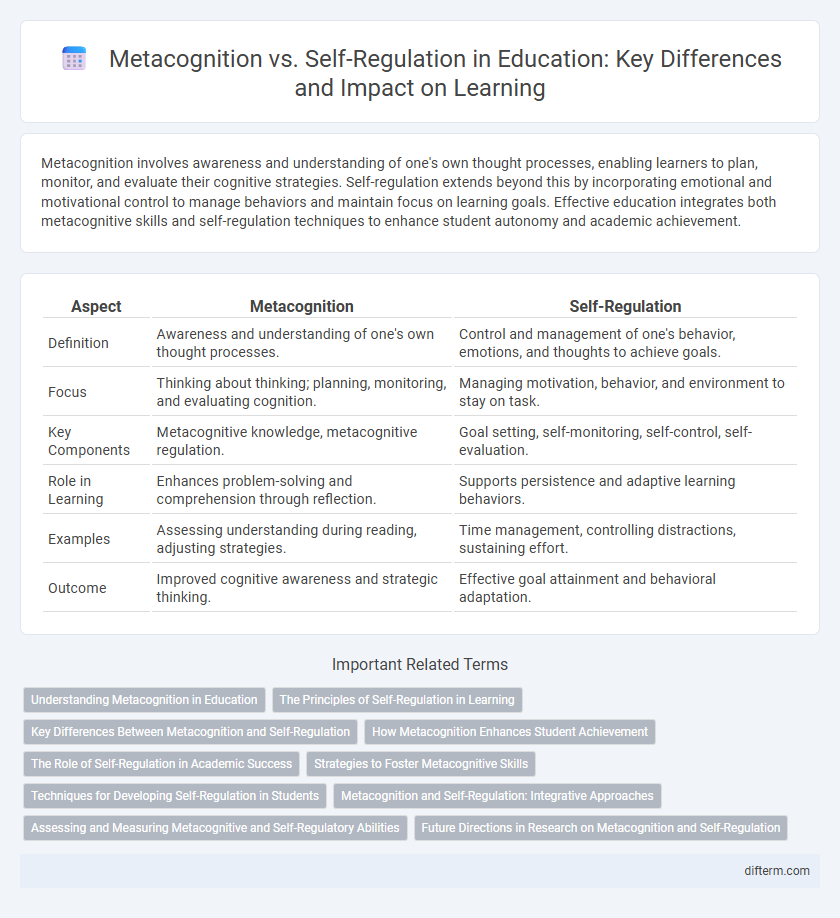Metacognition involves awareness and understanding of one's own thought processes, enabling learners to plan, monitor, and evaluate their cognitive strategies. Self-regulation extends beyond this by incorporating emotional and motivational control to manage behaviors and maintain focus on learning goals. Effective education integrates both metacognitive skills and self-regulation techniques to enhance student autonomy and academic achievement.
Table of Comparison
| Aspect | Metacognition | Self-Regulation |
|---|---|---|
| Definition | Awareness and understanding of one's own thought processes. | Control and management of one's behavior, emotions, and thoughts to achieve goals. |
| Focus | Thinking about thinking; planning, monitoring, and evaluating cognition. | Managing motivation, behavior, and environment to stay on task. |
| Key Components | Metacognitive knowledge, metacognitive regulation. | Goal setting, self-monitoring, self-control, self-evaluation. |
| Role in Learning | Enhances problem-solving and comprehension through reflection. | Supports persistence and adaptive learning behaviors. |
| Examples | Assessing understanding during reading, adjusting strategies. | Time management, controlling distractions, sustaining effort. |
| Outcome | Improved cognitive awareness and strategic thinking. | Effective goal attainment and behavioral adaptation. |
Understanding Metacognition in Education
Metacognition in education involves awareness and control of one's cognitive processes, enabling students to plan, monitor, and evaluate their learning strategies effectively. It differs from self-regulation by emphasizing the knowledge about cognition rather than the broader regulation of emotions and behaviors during learning. Understanding metacognition helps educators design interventions that foster students' ability to think about their thinking, leading to improved academic achievement and lifelong learning skills.
The Principles of Self-Regulation in Learning
Self-regulation in learning involves goal setting, self-monitoring, and strategic planning to enhance academic performance and foster independence. Key principles include maintaining motivation, managing time effectively, and adapting strategies based on feedback and self-assessment. Metacognition supports self-regulation by enabling learners to reflect on their cognitive processes, leading to improved control over learning activities and outcomes.
Key Differences Between Metacognition and Self-Regulation
Metacognition involves awareness and understanding of one's own thought processes, while self-regulation encompasses the ability to manage those thoughts, emotions, and behaviors to achieve specific learning goals. Key differences include metacognition's focus on monitoring and evaluating cognitive strategies, whereas self-regulation emphasizes goal-setting, motivation, and behavioral adjustments during learning. Both are critical for effective education but operate at distinct levels of cognitive control and personal management.
How Metacognition Enhances Student Achievement
Metacognition enhances student achievement by enabling learners to monitor and control their cognitive processes, improving problem-solving and critical thinking skills. Students who practice metacognitive strategies such as self-questioning and reflection demonstrate higher academic performance and deeper comprehension across subjects. This awareness of their own learning processes facilitates effective self-regulation, leading to sustained motivation and better adaptation to challenging tasks.
The Role of Self-Regulation in Academic Success
Self-regulation plays a critical role in academic success by enabling students to plan, monitor, and adjust their learning strategies effectively. Unlike metacognition, which focuses on awareness and understanding of one's cognitive processes, self-regulation involves actively managing emotions, motivation, and behaviors to achieve academic goals. Research indicates that strong self-regulatory skills correlate with higher grades, improved time management, and greater persistence in challenging tasks.
Strategies to Foster Metacognitive Skills
Promoting metacognitive skills in education involves explicit instruction in strategies such as self-questioning, goal-setting, and reflective journaling, which enhance learners' awareness of their cognitive processes. Teaching students to plan, monitor, and evaluate their understanding fosters effective self-regulation and improves academic performance. Integrating modeling of thought processes and providing feedback during problem-solving tasks further supports the development of metacognitive competence.
Techniques for Developing Self-Regulation in Students
Techniques for developing self-regulation in students include goal setting, self-monitoring, and strategic planning, which empower learners to take control of their academic progress. Incorporating reflective journaling and time management exercises enhances students' ability to evaluate their learning strategies and make adjustments accordingly. Using scaffolding methods and teaching stress management fosters resilience and sustained motivation critical for effective self-regulation in educational settings.
Metacognition and Self-Regulation: Integrative Approaches
Metacognition and self-regulation represent complementary cognitive frameworks essential in education for enhancing student learning outcomes and adaptive problem-solving skills. Integrative approaches combine metacognitive strategies such as planning, monitoring, and evaluating thought processes with self-regulatory mechanisms like goal setting, time management, and emotional control to foster autonomous, reflective learners. Empirical studies confirm that embedding these integrated techniques into curricula significantly improves academic performance, motivation, and lifelong learning competencies in diverse educational settings.
Assessing and Measuring Metacognitive and Self-Regulatory Abilities
Assessing metacognitive abilities involves evaluating learners' awareness and control over their cognitive processes, often through think-aloud protocols, self-report questionnaires, and task-based assessments that measure planning, monitoring, and evaluation strategies. Self-regulatory abilities are measured by analyzing goal-setting behaviors, time management skills, and adaptive responses to challenges, using instruments like the Self-Regulated Learning Interview Schedule (SRLIS) and structured observation methods. Reliable assessment tools that differentiate between metacognitive knowledge and regulation help educators tailor interventions that enhance both self-awareness and effective learning strategies.
Future Directions in Research on Metacognition and Self-Regulation
Future research on metacognition and self-regulation should focus on integrating neurocognitive measures with behavioral data to better understand underlying mechanisms. Exploring adaptive technologies and personalized learning environments can enhance real-time feedback and promote strategic self-regulation. Longitudinal studies examining developmental trajectories across diverse populations will provide critical insights into effective educational interventions and equity.
metacognition vs self-regulation Infographic

 difterm.com
difterm.com